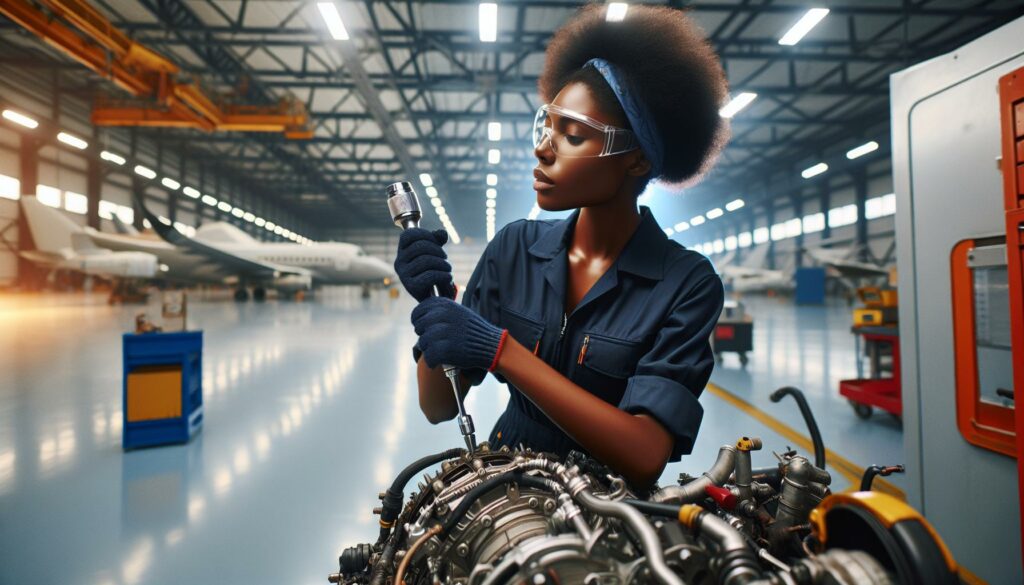As someone who’s spent years researching aviation careers I’ve noticed a growing interest about how much do aviation mechanics make. It’s no surprise since these skilled professionals play a crucial role in keeping our skies safe while earning competitive wages in the aviation industry.
I’ll break down how much do aviation mechanics make, including factors that influence their pay such as experience level certification type and work location. The aviation maintenance field offers diverse opportunities from commercial airlines to private companies and government positions. With the industry’s continued growth and increasing demand for air travel qualified mechanics can expect stable employment and attractive compensation packages.
Key Takeaways
- Aviation mechanics earn competitive salaries ranging from $35,000 for entry-level positions to $110,000+ for senior roles, with additional benefits and bonuses
- Certification type significantly impacts earnings, with A&P licensed mechanics earning $15,000-$25,000 more annually than non-certified technicians
- Commercial airlines offer the highest base salaries ($65,000-$125,000) compared to other sectors, along with comprehensive benefits including flight privileges and overtime pay
- Geographic location affects wages considerably, with major aviation hubs like San Francisco and New York offering 15-25% higher salaries than the national average
- Career advancement opportunities include leadership positions (earning up to $150,000), specializations in avionics or engine systems, and paths to management roles
How Much Do Aviation Mechanics Make?
An aviation mechanic repairs aircraft components maintaining airframes engines electrical systems to ensure flight safety. I diagnose mechanical issues repair components replace defective parts perform scheduled maintenance inspections.
Aviation mechanics specialize in specific areas:
- Airframe mechanics focus on aircraft structures control surfaces hydraulic systems
- Powerplant mechanics maintain aircraft engines propellers fuel systems
- Avionics technicians work on electronic instruments navigation communication equipment
- Combined A&P mechanics service both airframe powerplant systems
The Federal Aviation Administration (FAA) requires specific certifications:
- Airframe (A) license for aircraft body work
- Powerplant (P) license for engine maintenance
- Combined A&P certification for comprehensive aircraft maintenance
- Inspection Authorization (IA) for advanced oversight duties
- Conducting pre-flight safety inspections
- Identifying mechanical electrical issues using diagnostic equipment
- Repairing replacing worn aircraft components
- Documenting maintenance work in aircraft logs
- Testing aircraft systems to ensure proper operation
- Following FAA regulations safety protocols
| Certification Type | Training Duration | Practical Experience Required |
|---|---|---|
| Airframe (A) | 18-24 months | 1,900 hours |
| Powerplant (P) | 18-24 months | 1,900 hours |
| A&P Combined | 21-24 months | 3,000 hours |
| IA Certification | Additional training | 3 years A&P experience |
Average Salary Range for Aviation Mechanics
Aviation mechanics earn competitive salaries that vary based on experience level, location, and employer type. The compensation structure typically follows a tiered progression from entry-level to senior positions.
Entry-Level Salaries
Entry-level aviation mechanics earn between $35,000 to $45,000 annually. This salary range applies to mechanics with 0-2 years of experience who have obtained their A&P certification. Regional airlines offer starting salaries of $38,000 while major commercial carriers provide entry wages of $42,000.
Mid-Career Earnings
Mid-career aviation mechanics with 5-10 years of experience command salaries from $55,000 to $75,000 per year. Mechanics working at major airlines earn an average of $68,000 while those at maintenance repair organizations (MROs) make $62,000. Additional certifications in specialized areas like avionics increase mid-career earnings by 10-15%.
Senior-Level Compensation
Senior aviation mechanics with 15+ years of experience earn $85,000 to $110,000 annually. Lead mechanics at major airlines make up to $125,000 with overtime included. Corporate aviation departments offer the highest senior-level compensation at $115,000 plus benefits. Specialized roles such as inspector or shop supervisor command premium rates of $95,000 to $130,000.
| Experience Level | Salary Range | Additional Benefits |
|---|---|---|
| Entry-Level | $35,000-$45,000 | Health insurance, 401(k) |
| Mid-Career | $55,000-$75,000 | Profit sharing, overtime pay |
| Senior-Level | $85,000-$110,000 | Performance bonuses, pension plans |
Factors Affecting How Much Do Aviation Mechanics Make
Aviation mechanic salaries vary significantly based on several key factors that influence earning potential in the industry. These factors create substantial differences in compensation packages across different regions, sectors, and skill levels.
Geographic Location
Major aviation hubs offer higher salaries due to increased demand and cost of living adjustments. Cities like San Francisco, New York, and Seattle provide average salaries 15-25% above the national median. Here’s a breakdown of average annual salaries by region:
| Region | Average Salary Range |
|---|---|
| Northeast | $65,000 – $95,000 |
| West Coast | $70,000 – $98,000 |
| Midwest | $55,000 – $80,000 |
| Southeast | $52,000 – $78,000 |
Industry Sector
Different aviation sectors offer varying compensation levels based on operational demands and budgets. Commercial airlines typically provide the highest base salaries, while general aviation facilities offer more flexible schedules. Here’s a sector-wise breakdown:
| Sector | Annual Base Salary |
|---|---|
| Commercial Airlines | $65,000 – $110,000 |
| Corporate Aviation | $60,000 – $95,000 |
| Military Contractors | $58,000 – $92,000 |
| General Aviation | $45,000 – $75,000 |
| Certification/Specialization | Salary Premium |
|---|---|
| A&P License | +$15,000 – $25,000 |
| Avionics Certification | +$10,000 – $20,000 |
| Inspection Authorization | +$8,000 – $15,000 |
| Composite Repair | +$5,000 – $12,000 |
Top-Paying Industries for Aviation Mechanics
Aviation mechanics’ salaries vary significantly across different sectors of the aviation industry. Each sector offers unique compensation packages based on specific requirements responsibilities.
Commercial Airlines
Commercial airlines lead the aviation industry in mechanic compensation with base salaries ranging from $65,000 to $125,000 annually. Major carriers like United Airlines Delta Airlines offer comprehensive benefits packages including:
- Premium overtime rates at 1.5x to 2x base pay
- Annual profit-sharing bonuses averaging 5-15% of base salary
- Shift differential pay adding $2-5 per hour for night shifts
- Travel benefits including free or discounted flights
Government and Military
Federal aviation mechanics earn stable salaries following the GS-8 to GS-12 pay scale ranging from $54,000 to $89,000. Key benefits include:
- Regular cost-of-living adjustments
- Federal Employee Health Benefits (FEHB) coverage
- Thrift Savings Plan (TSP) with up to 5% matching
- Job security with established promotion paths
Private Aviation
Private aviation companies including corporate fleets charter services offer competitive salaries between $58,000 to $95,000. Distinguished features include:
- Performance-based bonuses up to 20% of base salary
- Flexible scheduling options with 4-day work weeks
- Training reimbursement programs up to $5,000 annually
- Aircraft-specific certification pay premiums of $2-4 per hour
| Industry Sector | Entry-Level | Mid-Career | Senior Level |
|---|---|---|---|
| Commercial Airlines | $65,000 | $85,000 | $125,000 |
| Government/Military | $54,000 | $72,000 | $89,000 |
| Private Aviation | $58,000 | $75,000 | $95,000 |
Career Growth and Advancement Opportunities
Aviation mechanics enjoy multiple pathways for career advancement through certifications, experience, and specialization. Entry-level mechanics progress to senior positions by acquiring additional certifications and demonstrating expertise in specific aircraft systems.
Certification-Based Advancement
- Obtain A&P certification to increase earning potential by $15,000-$25,000 annually
- Add Inspection Authorization (IA) certification for an additional $10,000-$20,000 salary boost
- Pursue avionics certification to access specialized roles with 15-25% higher pay
- Gain manufacturer-specific certifications for Boeing, Airbus, or Bombardier aircraft
Leadership Positions
- Lead Mechanic: Supervises 3-5 mechanics, earning $85,000-$110,000
- Maintenance Supervisor: Manages 10-15 technicians, earning $95,000-$120,000
- Director of Maintenance: Oversees entire maintenance operations, earning $110,000-$150,000
- Quality Control Inspector: Ensures compliance with FAA regulations, earning $80,000-$105,000
Specialized Career Paths
| Specialization | Starting Salary | Senior Level Salary |
|---|---|---|
| Avionics | $55,000 | $95,000 |
| Engine Specialist | $60,000 | $100,000 |
| Structural Expert | $52,000 | $92,000 |
| Test Engineer | $65,000 | $105,000 |
Educational Advancement
- Complete advanced technical training for specific aircraft types
- Earn bachelor’s degree in aviation maintenance management
- Obtain master’s degree in aerospace engineering
- Participate in manufacturer-sponsored training programs
- Transfer to aerospace manufacturing roles
- Move into aviation safety inspection positions
- Transition to technical training instructor roles
- Advance to maintenance planning positions
- Shift to aircraft engineering support teams
Benefits and Additional Compensation
Aviation mechanics receive comprehensive benefits packages beyond their base salaries. Major airlines offer health insurance plans covering 80-100% of medical costs plus dental coverage with annual maximums of $2,000-$3,000. Vision plans include annual eye exams with $150-$200 allowances for corrective eyewear.
| Benefit Type | Typical Coverage/Value |
|---|---|
| Health Insurance | 80-100% coverage |
| Dental Coverage | $2,000-$3,000 annual maximum |
| Vision Plan | $150-$200 eyewear allowance |
| 401(k) Match | 3-6% of salary |
| Paid Time Off | 2-5 weeks annually |
| Flight Benefits | 8-12 free flights yearly |
Additional compensation includes performance bonuses ranging from $2,000-$8,000 annually based on individual metrics like maintenance accuracy rates. Shift differentials add $1.50-$4.00 per hour for evening night shifts. Overtime opportunities provide 1.5x-2x base pay rates after 40 hours.
Most employers offer retirement benefits through 401(k) plans with 3-6% company matching contributions. Pension plans remain available at select airlines providing guaranteed retirement income based on years of service multipliers.
Travel perks include:
- Free or heavily discounted flights
- Companion passes for family members
- Hotel discounts of 20-40%
- Car rental discounts of 15-25%
- Priority boarding privileges
Professional development benefits feature:
- Certification reimbursement up to $5,000
- Annual training allowances of $1,000-$3,000
- Tool allowances of $500-$1,500
- Safety equipment stipends of $200-$400
- Technical publication subscriptions
Life insurance policies typically provide coverage equal to 1-2x annual salary with options to purchase additional coverage. Disability insurance covers 60-70% of base pay for qualifying medical conditions.
Benefits Packages
I’ve shown that aviation mechanics can earn substantial salaries ranging from $35000 for entry-level positions to over $125000 for experienced professionals at major airlines. The field offers excellent growth potential through certifications specializations and leadership roles.
With competitive benefits packages comprehensive healthcare coverage and unique perks like travel benefits it’s clear that aviation mechanics enjoy both financial stability and valuable job perks. The industry’s strong growth and constant demand for skilled professionals make this career path particularly attractive.
For those considering this profession I can confidently say that becoming an aviation mechanic offers a rewarding career with excellent earning potential and job security especially with the right certifications and experience.

